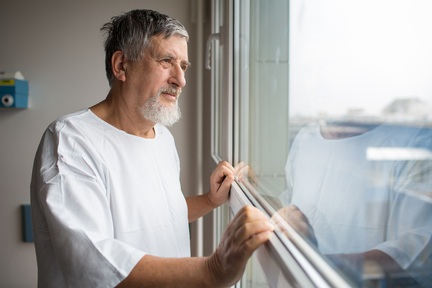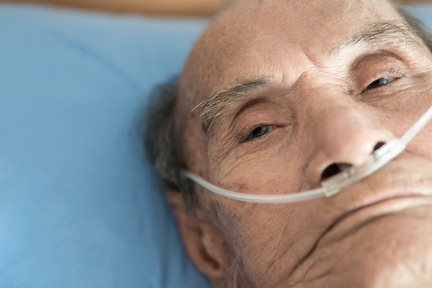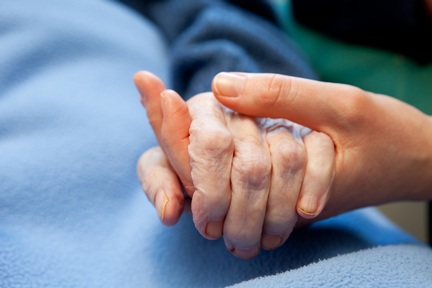One third of older people undergo 'unnecessary end-of-life treatments'
One third of older people hospitalised at the end of their life receive unnecessary and potentially harmful medical treatments, a new report has revealed.
The study, published in the International Journal for Quality in Health Care, conducted by researchers at the University of New South Wales (UNSW), Australia has highlighted the need for better training for doctors and more community education to reduce the number of non-beneficial invasive treatments in patients nearing the end of their life.

The review is one of the largest of its kind, focusing on older people from across the world who were hospitalised at the end of their life, and revealed that more than one third received invasive and potentially harmful medical treatments.
Dr Magnolia Cardona-Morrell, led the research at UNSW’s Simpson Centre for Health Services Research. Recognising that rapid advances in medical technology have led to unrealistic community expectations of the healing power of hospital doctors and their ability to ensure patients’ survival, she commented: “It is not unusual for family members to refuse to accept the fact that their loved one is naturally dying of old age and its associated complications and so they pressure doctors to attempt heroic interventions.
Doctors face an ethical dilemma
“Doctors also struggle with the uncertainty of the duration of the dying trajectory and are torn by the ethical dilemma of delivering what they were trained to do, save lives, versus respecting the patient’s right to die with dignity.”
The study revealed that up to 10 per cent of elderly patients are admitted to intensive care at the end of their life, and almost half of blood tests and imaging are carried out on unnecessarily on older patients, one third receive antibiotics for cardiovascular, digestive or endocrine medicines or chemotherapy during the last six weeks of their life.
Another 30 per cent undergo dialysis, radiotherapy, blood transfusions and other life support in the last days of life and one quarter of older people are given CPR when they have do-not-resuscitate orders.
Researchers analysed 38 studies over two decades, using data from 1.2 million patients, bereaved relatives and clinicians in 10 countries including Australia. The study revealed that the practice of doctors initiating excessive medical or surgical treatment on older patients in the last six months of their life is present in hospitals worldwide.
The global analysis of 38 studies included patients, bereaved relatives, doctors and nurses from the USA, Canada, England, Australia, France, Holland, Brazil, Taiwan, South Korea and Israel.

The study revealed some 33 per cent of elderly patients living with irreversible chronic conditions were given non-beneficial interventions, such as: admission to intensive care or chemotherapy in the last two-weeks of life, while others with do-not-resuscitate orders were still given CPR.
Researchers further found evidence to suggest invasive procedures were being carried out, including: unnecessary imaging and blood tests, intensive cardiac monitoring and concurrent treatment of other multiple acute conditions with complex medications that made little or no difference to the outcome, but which could prevent a comfortable death for patients.
Dr Cardona-Morrell continued: “Our findings indicate the persistent ambiguity or conflict about what treatment is deemed beneficial and a culture of ‘doing everything possible’. The lack of agreed definitions in the medical community of what constitutes ‘treatment futility’ also makes a global dialogue challenging.
“However, using data from these studies we have defined as non-beneficial those procedures or medical treatments administered to elderly people in terminal stages of disease which prolong suffering rather than survival, that can potentially cause harm, are sometimes given against patients’ wishes and are unlikely to improve the person’s health or quality of remaining life.
“More importantly, we have identified measurable indicators and strategies to minimise this type of intervention. An honest and open discussion with patients or their families is a good start to avoid non-beneficial treatments. We hope hospitals can monitor these indicators during their quality improvement activities.”
Normalising death and taking a step back
A previous paper published in the BMJ Supportive and Palliative Care talks of an assessment tool developed by UNSW BMJ researchers which helps doctors and care givers to accurately identify elderly patients whose death is imminent and unavoidable at the time of hospital admission.
As the number of frail, older people increase, the number of hospital admissions is anticipated to increase. The report focuses on reducing the chance of admission and the requirement for non-essential treatments and procedures.
Dr Cardona-Morrell continued: “More training for doctors will help them let go of the fear of a wrong prognosis, because they will be better able to identify patients near the end of life. “As a community we must also stop shying away from the topic of death. Start a discussion now with your elderly loves ones about their end-of-life care preferences before they become too ill to have that conversation.”

Speaking on behalf of terminal illness charity, Marie Curie, medical director Professor Bill Noble, said: “We need to get past the idea that providing palliative care is giving up on a patient. Early access to palliative care will greatly improve quality of life for both patients and their families and also gives people a chance to have honest conversations about treatment options, and what to expect as their condition progresses. This makes harmful interventions at the end of someone’s life less likely and helps families deal with their impending bereavement.
“Research in the USA showed that palliative care can lengthen survival by reducing the perceived need for chemotherapy when patients are already very ill.
“Television and film is often guilty of depicting medicine as a heroic battle rather than something that’s facilitating a natural lifespan. This damaging portrayal perpetuates the unrealistic expectations about what doctors can do for patients, especially those with terminal illnesses who might be approaching the end of their lives.”
Dr Cardona-Morrell added: “Old age and advance chronic illness are the most significant predictors of death. So if science and medicine cannot offer anything further to ensure the survival of a person with those characteristics we'd better start talking about our end-of-life care preferences and preferred place of death.
“We need to get involved in one of the most important decisions of our lives: How to die well. We need to normalise death and take a step back before putting pressure on clinicians to ‘do everything’ because technology is there to keep us alive. This places the health system under a lot of stress, escalates the costs of healthcare and takes away the patient's right to die with dignity.”
Latest News Analysis
 04-Sep-19
Extra £1.5 billion announced for social care in Chancellor's Spending Review
04-Sep-19
Extra £1.5 billion announced for social care in Chancellor's Spending Review
 02-Jul-19
Department of Health forced to rethink care homes' nursing rates after legal challenge
02-Jul-19
Department of Health forced to rethink care homes' nursing rates after legal challenge
 18-Jun-19
Overnight care workers forced to sleep in offices and told 'bring your own bedding'
18-Jun-19
Overnight care workers forced to sleep in offices and told 'bring your own bedding'
 14-Jun-19
Back in the closet: Third of care home staff have had no LGBT+ awareness training
14-Jun-19
Back in the closet: Third of care home staff have had no LGBT+ awareness training
 11-Jun-19
PM candidates on social care: Rory Stewart calls fixing care an 'unfinished revolution'
11-Jun-19
PM candidates on social care: Rory Stewart calls fixing care an 'unfinished revolution'